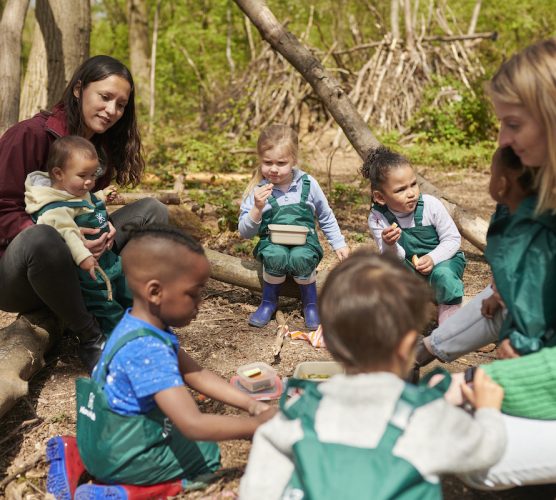When you start thinking about becoming a childminder, you might chat to your friends and family about the practical side of things, and be put off by their negative comments. ‘You couldn’t do that… Who will look after your own kids?’ ‘We don’t have enough room to have children in the house!’ ‘It will take ages to get the right qualifications for that.’
Don’t stop yourself before you have even started: the journey to becoming a childminder is paved with many myths that are simply not true. Here are ten that we have heard a lot at Koru Kids.
To learn more about how to become a childminder, read our ultimate guide to childminding.
Myth #1: Childminders can’t work from a rented property
You have a lovely big house with a great garden and a spare bedroom, but… You’re renting! Is there any point in asking your landlord, housing association or local authority for permission to start running your childminding business from their property?
Yes, there is. While some may refuse, there are many who are happy for you to run a childminding business from your home. If you are running a lucrative business, they have further safety in always being paid their rent on time, and they will have a happy tenant too.
Often all you need is to reassure them that you will make good any small alterations (like fitting stairgates), and that you’ll only have children in daytime weekday hours, so they’re not worried about you disturbing the neighbours. So if you’re serious about looking after awesome mini humans for a living, just ask.
Myth #2: Childminders can’t look after their own children
This is 100% not true. One of the beauties of being a childminder is that you can keep your own children with you whilst you work!
You can actually look after up to six children under the age of 8 (with no limit to the number of over-8s).
If you have a toddler of your own you can have them as part of that three: you will simply earn less (but you won’t pay for childcare either!). If your kids are older than 5 it’s perfectly fine for them to be around after school, and the little ones often love having them home.
Myth #3: Childminders need previous experience and qualifications
You enjoy spending time with children and love nurturing and learning from them, so becoming a childminder seems like an obvious choice. But when you talk about it with your friends, they mention how long it would take to get qualified, and how expensive it would be before you could even start to run your own business. It really doesn’t have to be that way.
Myth #4: Childminding means I have to work alone
You love children and have lots of fun together, but you think it might get lonely from time to time being the only adult in the house. If you become a childminder, will you be cooped up in your house 5 days a week, never seeing other adults? Not necessarily.
First off, you will be taking the children out every day, to a park, the woods, a farm, or whatever lovely, muddy place you can discover together. Bumping into another childminder or nanny is a lovely way to introduce the children you care for to other adults before you continue on your outdoor adventures.
If you have the space for more children, you can take on an assistant: you will have companionship and earn extra money at the same time. Childminders in inner London that work alongside an assistant can earn up to £70,000 a year.
If you miss a chat, no-one will be happier to talk than parents picking their children up at the end of the day: they love nothing more than to hear about how their children are doing and developing. Don’t forget our friendly online community either, always easy to reach if you need a word of advice.
Myth #5: Childminders can’t work from a flat
You live in a 2-bedroom apartment with a nice living-room, where you share one bedroom with your partner, and your 3-year-old sleeps in the other. It would be amazing to run a childminding business from home, but with a single bedroom for children, you know there just wouldn’t be room. That’s not entirely true: you only need about 2-3.5 square metres for each child you are looking after—so most flats are plenty big enough.
As long as your home is safe and clean, with a good area to prepare healthy, tasty food, and you can use one or both bedrooms as a dark room for children to nap away in a pop-up cot, there is nothing stopping you from being a childminder if you live in a flat.
Myth #6: Being a childminder is not a ‘proper job’—anyone can do it
As much as you love children and spending time outdoors, coming up with fun things for them to do and new places to go, you worry that people won’t regard childminding as a ‘proper job’. After all, can’t anyone do that job? Absolutely not.
To become a childminder, you need to be caring, reliable, and passionate about children. If you have kids yourself, you know how much trust it takes to leave them with someone else. It says something about who you are when parents meet you and decide they will leave the centre of their world in your care.
You also have to go through our in-depth training to become an Early Educator: we recognise that a childminder does a great deal more than just ‘minding’ children, and use the term ‘Early Educator’ to demonstrate the important impact childminders will have on children’s learning and development.
You will gain the qualifications and skills to support children mentally and emotionally through those crucial early years. What you do in your job will create a ‘butterfly effect’ throughout society, now and in their future as adults.
Myth #7: Childminders need to have a garden
The Gov.uk website mentions that you need to be able to ‘provide access to a secure outdoor space’ for the children you care for, so you figure that that’s it: no garden, no home nursery. But if you read on, you will see that it also says you can ‘make reasonable arrangements for outdoor activities’ if you don’t have outdoor access directly from your home. So nope, you don’t need a garden!
If you live in London, for instance, there are more lovely parks—and other green spaces—around than you would think. And one London park might have half a dozen different areas you could happily spend a morning in with some toddlers. It will be a lot more fun for you all to get out and about than always being in your own garden.
So even if you do have a garden, leaving the house and heading to a green space will be the best way to spend a morning with little ones (just don’t forget to bring the puddle-suits!).
Myth #8: Childminders can’t have pets
If you have a furry friend or two around the house, you might think that’s the beginning and end of your career as a childminder. But there are actually many parents who would love for their children to grow up around pets.
Children who grow up in households with pets are less likely to develop allergies, and more likely to become empathic and kind. If the child has a pet at home, having one in a childcare setting will also give them a lovely sense of familiarity.
So though having a pet isn’t a requirement, it absolutely shouldn’t stop you from becoming a childminder: so long as your pet is friendly and safe to have around little children.
Myth #9: Childminding is a backward step career-wise
You’ve slogged away in your chosen ‘career’ climbing the ranks bit by bit, but it’s not fulfilling on an emotional level—or just darned hard! You want to do something that you know will make a difference in the long run… and will mean you stop dreading Monday mornings. But there is a part of you that’s worried that your friends will think childminding is a ‘step down’ career-wise.
If you think that earning up to £70,000 a year in inner London, managing an assistant childminder, and helping to raise kind, curious, confident children that will make a big impact on the future of the world because you were there for them as a qualified EYFS childminder sounds like a ‘step down’, you must have a really exciting job right now.
There are many people from different backgrounds—teachers, accountants, dancers, chefs—who have chosen to become childminders instead, and to them, it was a step in the right direction.
Myth #10: Childminders have to be inspected by Ofsted
Yes, we said it: Ofsted. It can seem scary and daunting, and it’s a big factor putting many people off childminding as a career.
Childminders registered directly with Ofsted will usually be inspected within the first 30 months of registering as a childminder or childcare provider, and at least once every 6 years after that. And may also be inspected if someone reports concerns about the childcare provided.
Any childminding agencies registered with Ofsted have the statutory powers to send out one of their own friendly assessors to your home to help you through the process, making sure your home and your qualifications are up to scratch, and giving you pointers for that Good or Outstanding rating you need.
Agencies make sure at every step of registration—and once you’re up and running—that we make it 100% clear what’s required, and support you to tick off each bit of paperwork. That way, you get to spend your time looking after amazing mini humans instead.
Did we miss any of the worst myths about becoming a childminder? Do you still have questions or concerns before you set out on a rewarding career as a ‘Hero to Families Big and Small’?
If you’re not sure childminding is right for you, you can learn more about becoming a nanny instead.



